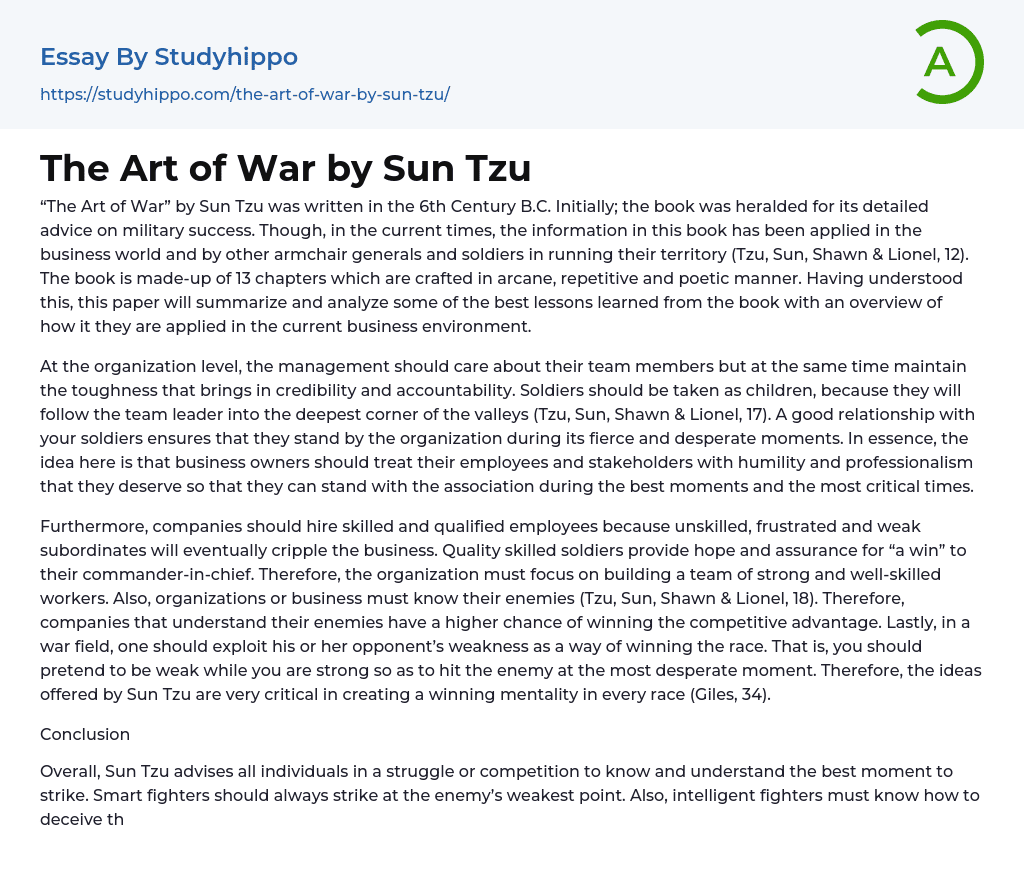“The Art of War” by Sun Tzu was written in the 6th Century B.C. Initially; the book was heralded for its detailed advice on military success. Though, in the current times, the information in this book has been applied in the business world and by other armchair generals and soldiers in running their territory (Tzu, Sun, Shawn & Lionel, 12). The book is made-up of 13 chapters which are crafted in arcane, repetitive and poetic manner. Having understood this, this paper will summarize and analyze some of the best lessons learned from the book with an overview of how it they are applied in the current business environment.
At the organization level, the management should care about their team members but at the same time maintain the toughness that brings in credibility and accountability. Soldiers should be taken as children, because they will follow the team lead
...er into the deepest corner of the valleys (Tzu, Sun, Shawn & Lionel, 17). A good relationship with your soldiers ensures that they stand by the organization during its fierce and desperate moments. In essence, the idea here is that business owners should treat their employees and stakeholders with humility and professionalism that they deserve so that they can stand with the association during the best moments and the most critical times.
Furthermore, companies should hire skilled and qualified employees because unskilled, frustrated and weak subordinates will eventually cripple the business. Quality skilled soldiers provide hope and assurance for “a win” to their commander-in-chief. Therefore, the organization must focus on building a team of strong and well-skilled workers. Also, organizations or business must know their enemies (Tzu, Sun, Shawn & Lionel,
18). Therefore, companies that understand their enemies have a higher chance of winning the competitive advantage. Lastly, in a war field, one should exploit his or her opponent’s weakness as a way of winning the race. That is, you should pretend to be weak while you are strong so as to hit the enemy at the most desperate moment. Therefore, the ideas offered by Sun Tzu are very critical in creating a winning mentality in every race (Giles, 34).
Conclusion
Overall, Sun Tzu advises all individuals in a struggle or competition to know and understand the best moment to strike. Smart fighters should always strike at the enemy’s weakest point. Also, intelligent fighters must know how to deceive their enemies; i.e. Acting weak when they are strong (Tzu & Tom, 15). That is, knowing your strengths and weaknesses before embarking into any struggle. Sun Tzu offers the best advice for businesses to maintain their competitive advantage regardless of the steady competition in the marketplace.
Work Cited
- Tzu, Sun, Shawn Conners, and Lionel Giles. The Art of War by Sun Tzu - Classic Edition. Capstone Publishing Ltd: El Paso Norte Press, 2009. Print.
- Tzu, Sun, and Tom Butler-Bowdon. The Art of War: The Ancient Classic. Chichester: John Wiley & Sons, 2010. Print.
- Giles. Sun Tzu on the Art of War. Hoboken: Taylor and Francis, 2013.well Print.
- Adaptation essays
- Adventure essays
- Adversity essays
- Aging essays
- Alcohol essays
- Barbie Doll essays
- Beauty essays
- Care essays
- Carpe diem essays
- Change essays
- Chess essays
- Chicken essays
- Choices essays
- Contrast essays
- Crops essays
- Development essays
- Dream essays
- Evil essays
- Experience essays
- Family essays
- Farm essays
- Fire essays
- First Love essays
- Focus essays
- Greed essays
- Hero essays
- Holiday essays
- House essays
- Housing essays
- Humility essays
- Humor essays
- Hypocrisy essays
- Integrity essays
- Law of Life essays
- Life Changing Experience essays
- Life Experience essays
- Lifestyle essays
- Limitations essays
- Love Story essays
- Mother Tongue essays
- Motherhood essays
- My Neighborhood essays
- Myself essays
- Mystery essays
- Narcissism essays
- Never Give Up essays
- Nursing essays
- Object essays
- Opportunity essays
- Peel essays




